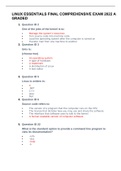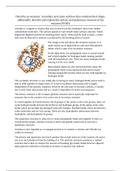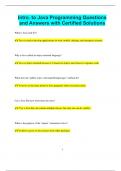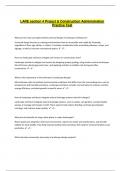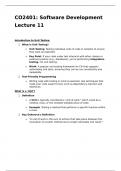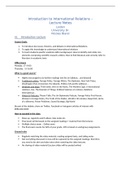Individual Differences: Personality
and Intelligence
February 13th 2022
Individual differences - Lecture 1
Part 1
- Core reading is Personality, Individual Differences and Intelligence by Maltby
- Presentation due in week 6 or 7
- Test in week 13
- Differential/personality/intelligence psychology
- What makes people different from each other
Part 2 - Freudian approaches to personality
- Learn to critically evaluate
- Our behaviour is motivated by unconscious processes
- personality is a coherent entity that affects our current motivations
- Psychodynamic approach focuses on our unconscious processes
- Psychic determinism: all behaviour has a cause (usually found in the unconscious
processes in our minds)
- Before Freud's theory it was assumed that it was due to a possession or degeneracy,
Freud first to argue behaviour is not either normal or abnormal but exists on a
continuum
- Emphasised the value of clinical practice
- Unconscious is most motivational on our behaviours
- Awareness broken down into 3 sections
- Conscious level (what has your attention), preconscious level (Things stored in your
memory you're not using right now), unconscious (ideas, experiences and feelings
that are blocked from awareness by repression, can't be accessed but sometimes
leak out)
- Sex is the strongest motivator on our behaviour
- Children are born with: Drive for sex, life preserving drive, the death instinct
(Thanatos)
- After WW1 he observed people could do horrible things and live with them, so added
the death instinct
- Our behaviour is motivated by our attempts to satisfy these instinctual drives
- Personality is made up of 3 things: Id, superego and ego
- Id = never aware of it unless it leaks out, where raw instincts are held, born with this,
these drives motivate our behaviour and we overcome them via the pleasure
, principle,m delayed gratification means children do not understand waiting for their
needs to be met, no patience, there and then
- Toddlers start to learn this isn't true, tantrums don't get you what you want, learn to
satisfy motivator in ID
- Ego = planning thinking and organising part of our personality, operates according to
reality principle, meaning we can only satisfy urges in socially acceptable ways eg.
politeness gets you what you want
- Superego = conscious of child, develops last, helps us decide what's right and
wrong, rechannels instincts, opposite of ID
- There is conflict between the three personality parts
- conflict is where mental illness and anxiety comes from
Psychosexual stages
- We are constantly trying to satisfy that urge for sexual pleasure
- We recieve pleasure from different places throughout our lives
- erogenous zones
- our libido is located in different parts of the body at different ages
- First 3 stages are most impactful
- Oral stage is from 0-18 months, sucking, biting, swallowing, biggest source of
pleasure is feeding, erogenous zones are lips, tongue and mouth
- proper development of oral stage means healthy graduation to next stage, but can
become fixated or stuck at this stage of development if over or under stimulated
- excessive oral stimulation craved as adults eg. smoking (over) or an exploitative
personality (under)
- Anal stage: 18m-3y, age of potty training, pleasure comes from bowel movement,
reinforcement gained from that so it becomes a source of pleasure
- conflict with parents over potty training can lead to fixation
- fixation can lead to rebelling against authority, stubborn, 'anal' about things
- The phallic stage: 3-5 years. Pleasure source is masturbation, erogenous zone is
genitals,
- boys develop castration anxiety which leads to the Oedipus complex, envious of
father, afraid of him, conflict between desire and fear leads to boy becoming more
like his dad.
- girls develop penis envy, which leads to the Electra complex. They are envious of
boy's penises, father a source of sexual attraction, leads to confusion and anxiety so
they identify more closely with their mum
- Fixation at this stage can impact behaviour. Males can be promiscuous, females can
develop masculine traits or become attracted to women
- Latency stage, 5-12 years, pleasure source is socialising with same sex others,
develop defence mechanisms
- The genital stage 12-18+ - normal development makes you straight, sexual
attraction, abnormal development makes you gay.
defence mechanisms
- self esteem important to keep us psychologically healthy
- defence mechanisms can be used in a bad way
, - repression is pushing things to the back of your mind
- very few studies can prove or disprove freud's work
- Morokoff (1985) did a study, 2 groups, one sexually guilty one not, showed both a
porno, measured both physiological and self report measures of sexual arousal
- an example is someone saying they never get angry, argument is they're repressing
their feelings of anger
- denial is denying unpleasant events
- phantom limb phenomena may be an example of denial
- rationalisation is where you didn't get as positive of an outcome as you wanted, so
attempt to justify the results, didn't want the job anyway
Evaluating Freud's work
- Pros come from impact it's had on our language and awards he's won rather than
evidence
- Theory based mostly on info from his 15 or so patients, meaning its unreliable, didn't
publish all of his case studies
- theory mostly descriptive and can't be tested
- theory can't be used to predict behaviour
- hugely well known, referred to every day
- words he used have become common in our language
Recap
- had a very influential theory
- validity of it questioned
- Is there enough research evidence?
February 15th 2023
Seminar 1
Journal articles are:
- Journal articles are disciplin specific
- peer reviewed
- presents original research
- follows academic writing conventions (style, referencing)
Reading a journal article
- Start with abstract
- Title should be clear and say what it says it'll say
- no statistics or references in the abstract
- leave results to last
- look at introduction and method
- look at discussion
- then look at results
- subjective is self report, objective is computer measured
- Just read end of intro to save time
- look for reviews of your article, there will be loads of other references
and Intelligence
February 13th 2022
Individual differences - Lecture 1
Part 1
- Core reading is Personality, Individual Differences and Intelligence by Maltby
- Presentation due in week 6 or 7
- Test in week 13
- Differential/personality/intelligence psychology
- What makes people different from each other
Part 2 - Freudian approaches to personality
- Learn to critically evaluate
- Our behaviour is motivated by unconscious processes
- personality is a coherent entity that affects our current motivations
- Psychodynamic approach focuses on our unconscious processes
- Psychic determinism: all behaviour has a cause (usually found in the unconscious
processes in our minds)
- Before Freud's theory it was assumed that it was due to a possession or degeneracy,
Freud first to argue behaviour is not either normal or abnormal but exists on a
continuum
- Emphasised the value of clinical practice
- Unconscious is most motivational on our behaviours
- Awareness broken down into 3 sections
- Conscious level (what has your attention), preconscious level (Things stored in your
memory you're not using right now), unconscious (ideas, experiences and feelings
that are blocked from awareness by repression, can't be accessed but sometimes
leak out)
- Sex is the strongest motivator on our behaviour
- Children are born with: Drive for sex, life preserving drive, the death instinct
(Thanatos)
- After WW1 he observed people could do horrible things and live with them, so added
the death instinct
- Our behaviour is motivated by our attempts to satisfy these instinctual drives
- Personality is made up of 3 things: Id, superego and ego
- Id = never aware of it unless it leaks out, where raw instincts are held, born with this,
these drives motivate our behaviour and we overcome them via the pleasure
, principle,m delayed gratification means children do not understand waiting for their
needs to be met, no patience, there and then
- Toddlers start to learn this isn't true, tantrums don't get you what you want, learn to
satisfy motivator in ID
- Ego = planning thinking and organising part of our personality, operates according to
reality principle, meaning we can only satisfy urges in socially acceptable ways eg.
politeness gets you what you want
- Superego = conscious of child, develops last, helps us decide what's right and
wrong, rechannels instincts, opposite of ID
- There is conflict between the three personality parts
- conflict is where mental illness and anxiety comes from
Psychosexual stages
- We are constantly trying to satisfy that urge for sexual pleasure
- We recieve pleasure from different places throughout our lives
- erogenous zones
- our libido is located in different parts of the body at different ages
- First 3 stages are most impactful
- Oral stage is from 0-18 months, sucking, biting, swallowing, biggest source of
pleasure is feeding, erogenous zones are lips, tongue and mouth
- proper development of oral stage means healthy graduation to next stage, but can
become fixated or stuck at this stage of development if over or under stimulated
- excessive oral stimulation craved as adults eg. smoking (over) or an exploitative
personality (under)
- Anal stage: 18m-3y, age of potty training, pleasure comes from bowel movement,
reinforcement gained from that so it becomes a source of pleasure
- conflict with parents over potty training can lead to fixation
- fixation can lead to rebelling against authority, stubborn, 'anal' about things
- The phallic stage: 3-5 years. Pleasure source is masturbation, erogenous zone is
genitals,
- boys develop castration anxiety which leads to the Oedipus complex, envious of
father, afraid of him, conflict between desire and fear leads to boy becoming more
like his dad.
- girls develop penis envy, which leads to the Electra complex. They are envious of
boy's penises, father a source of sexual attraction, leads to confusion and anxiety so
they identify more closely with their mum
- Fixation at this stage can impact behaviour. Males can be promiscuous, females can
develop masculine traits or become attracted to women
- Latency stage, 5-12 years, pleasure source is socialising with same sex others,
develop defence mechanisms
- The genital stage 12-18+ - normal development makes you straight, sexual
attraction, abnormal development makes you gay.
defence mechanisms
- self esteem important to keep us psychologically healthy
- defence mechanisms can be used in a bad way
, - repression is pushing things to the back of your mind
- very few studies can prove or disprove freud's work
- Morokoff (1985) did a study, 2 groups, one sexually guilty one not, showed both a
porno, measured both physiological and self report measures of sexual arousal
- an example is someone saying they never get angry, argument is they're repressing
their feelings of anger
- denial is denying unpleasant events
- phantom limb phenomena may be an example of denial
- rationalisation is where you didn't get as positive of an outcome as you wanted, so
attempt to justify the results, didn't want the job anyway
Evaluating Freud's work
- Pros come from impact it's had on our language and awards he's won rather than
evidence
- Theory based mostly on info from his 15 or so patients, meaning its unreliable, didn't
publish all of his case studies
- theory mostly descriptive and can't be tested
- theory can't be used to predict behaviour
- hugely well known, referred to every day
- words he used have become common in our language
Recap
- had a very influential theory
- validity of it questioned
- Is there enough research evidence?
February 15th 2023
Seminar 1
Journal articles are:
- Journal articles are disciplin specific
- peer reviewed
- presents original research
- follows academic writing conventions (style, referencing)
Reading a journal article
- Start with abstract
- Title should be clear and say what it says it'll say
- no statistics or references in the abstract
- leave results to last
- look at introduction and method
- look at discussion
- then look at results
- subjective is self report, objective is computer measured
- Just read end of intro to save time
- look for reviews of your article, there will be loads of other references

